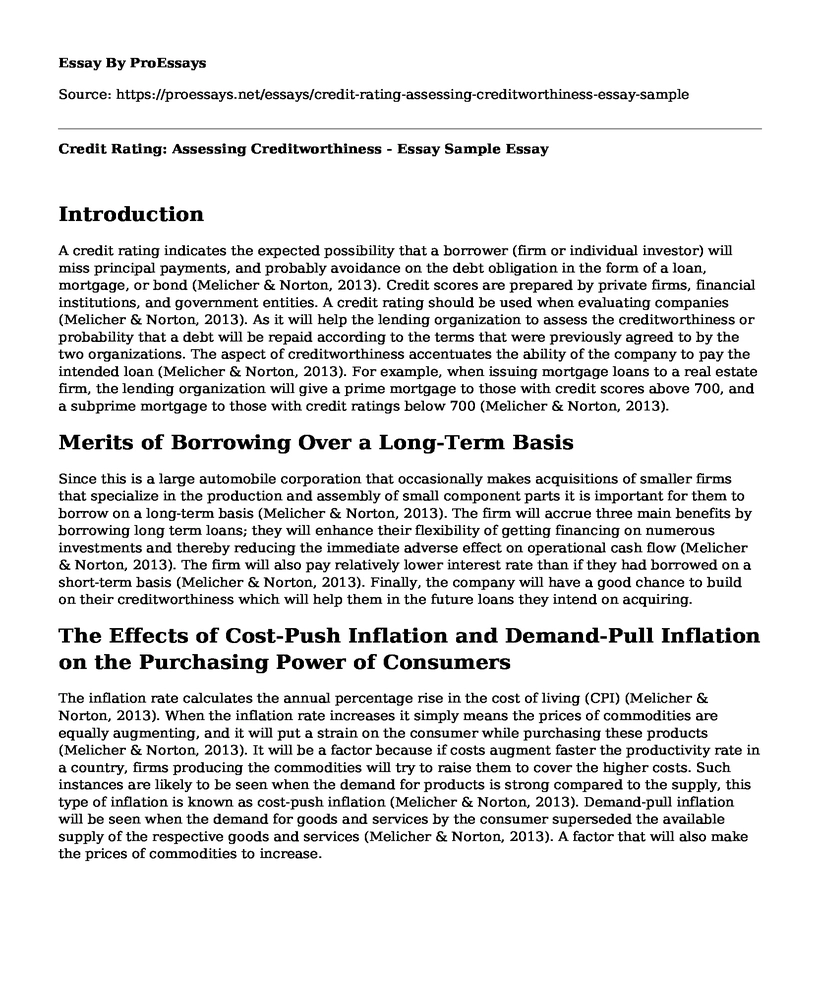Introduction
A credit rating indicates the expected possibility that a borrower (firm or individual investor) will miss principal payments, and probably avoidance on the debt obligation in the form of a loan, mortgage, or bond (Melicher & Norton, 2013). Credit scores are prepared by private firms, financial institutions, and government entities. A credit rating should be used when evaluating companies (Melicher & Norton, 2013). As it will help the lending organization to assess the creditworthiness or probability that a debt will be repaid according to the terms that were previously agreed to by the two organizations. The aspect of creditworthiness accentuates the ability of the company to pay the intended loan (Melicher & Norton, 2013). For example, when issuing mortgage loans to a real estate firm, the lending organization will give a prime mortgage to those with credit scores above 700, and a subprime mortgage to those with credit ratings below 700 (Melicher & Norton, 2013).
Merits of Borrowing Over a Long-Term Basis
Since this is a large automobile corporation that occasionally makes acquisitions of smaller firms that specialize in the production and assembly of small component parts it is important for them to borrow on a long-term basis (Melicher & Norton, 2013). The firm will accrue three main benefits by borrowing long term loans; they will enhance their flexibility of getting financing on numerous investments and thereby reducing the immediate adverse effect on operational cash flow (Melicher & Norton, 2013). The firm will also pay relatively lower interest rate than if they had borrowed on a short-term basis (Melicher & Norton, 2013). Finally, the company will have a good chance to build on their creditworthiness which will help them in the future loans they intend on acquiring.
The Effects of Cost-Push Inflation and Demand-Pull Inflation on the Purchasing Power of Consumers
The inflation rate calculates the annual percentage rise in the cost of living (CPI) (Melicher & Norton, 2013). When the inflation rate increases it simply means the prices of commodities are equally augmenting, and it will put a strain on the consumer while purchasing these products (Melicher & Norton, 2013). It will be a factor because if costs augment faster the productivity rate in a country, firms producing the commodities will try to raise them to cover the higher costs. Such instances are likely to be seen when the demand for products is strong compared to the supply, this type of inflation is known as cost-push inflation (Melicher & Norton, 2013). Demand-pull inflation will be seen when the demand for goods and services by the consumer superseded the available supply of the respective goods and services (Melicher & Norton, 2013). A factor that will also make the prices of commodities to increase.
The Main Difference Between Term Structure of Interest Rates and Yield Curve
The term structure of interest rates displays the relationship between interest rates or yields and the maturity of comparable quality debt instruments (Melicher & Norton, 2013). A yield curve is a graphical representation of the term structure of yields at a given point in time (Melicher & Norton, 2013).
Impact of Running Off Oil That Was Formulated Under Lemonade On Interest Rates
The interest rates and oil prices tend to move strictly together, therefore the decision to allow automobiles to run off oil-based lemonade would have a direct effect on the interest rates (Domm, 2016). Recently the oil prices were up more than 4 percent, which means the firm that depended on oil make their production would be required to pay a lot of interest rate (Domm, 2016). For instance, a West Texas Intermediate Crude firm ended up paying $52.84 per barrel due to the increase in the oil price (Domm, 2016). The same scenario would happen in the automobile firm if they choose to go in that direction. The technology that seems to help revolutionize the oil and gas sector is the blockchain revolution. Blockchain will have great advantages both upstream and downstream on the firm (Husseini, 2018). It will begin by scheduling automobile equipment maintenance to manage exploration acreage records (Husseini, 2018). Finally, it is essential to exposing the efficiency potential of distributed energy generation (Husseini, 2018).
Ratios to Evaluate the Financial Health of Potential Acquisition
A default risk ratio assesses whether the probability at which a borrower will not pay interest on a loan as per the agreed contractual terms. Firms with default risk ratios between 1.0 and 3.0 are said to be "medium risk" while those with 3.0 and higher are designed to be "low risk" (Melicher & Norton, 2013). Liquidity ratios are used to evaluate the ability of a firm to offset short term financial obligations, examples of these ratios include; current ratio and quick ratio (Melicher & Norton, 2013).
References
Domm, P. (2016). What rising oil means for interest rates. Retrieved from: https://www.cnbc.com/2016/12/12/what-rising-oil-means-for-interest-rates.html
Husseini, T. (2018). The future of oil and gas: Eight bold industry predictions. Retrieved from: https://www.offshore-technology.com/features/the-future-of-oil-and-gas-predictions/
Melicher, R. W., & Norton, E. A. (2013). Introduction to finance: Markets, investments, and financial management. John Wiley & Sons.
Cite this page
Credit Rating: Assessing Creditworthiness - Essay Sample. (2023, Mar 23). Retrieved from https://proessays.net/essays/credit-rating-assessing-creditworthiness-essay-sample
If you are the original author of this essay and no longer wish to have it published on the ProEssays website, please click below to request its removal:
- Analysis of Tear Fund Financial Statements
- Profit and Profitability Research Paper
- Remote and Mainstream Food Retail Markets
- Company Overview of the Gillette Company Paper Example
- Essay on Foreign Direct Investment Inflow: Analysis of ME Countries, India, KSA, UAE
- Post-Investment Hold-Up: Sunk Cost, Contract, Breach, Damages - Essay Sample
- Paper Example on Managing Money: Financial Management, Investments & Cash Flow Analysis







